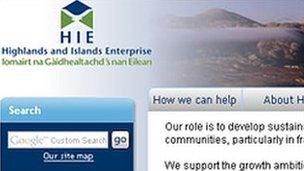Enterprise bodies 'only helping elite'
- Published

Highlands and Islands Enterprise is responsible for economic development in the north west
Pressure is building for reform to Scottish Enterprise and Highlands and Islands Enterprise, including the option of merger.
Holyrood's 's economy, energy and tourism committee is looking into the future of the country's economic development agencies.
Evidence to it includes criticism that they are only helping an elite group of 2,500 companies.
Many companies claim they feel unsupported.
Despite being the bedrock of their local economy, the companies do not fit the agencies' criteria as having potential for rapid growth.
There are also complaints that reforms in the past three years have led to some confusion, with the benefits still unclear.
These include transfer of Scottish Enterprise's training and careers service to another government agency, Skills Development Scotland, while local economic development moved to council control.
The Scottish Trades Union Congress (STUC) has told MSPs that workforce training has been neglected as a result of these changes.
Among the responses to a call for evidence to the Holyrood committee inquiry, there is consensus on the need to keep an economic development agency, 20 years after it was set up to bring more business culture to the previous Scottish Development Agency.
By contrast, the new government at Westminster is abolishing regional development agencies for England, and replacing them with business partnerships.
However, there is little sign of consensus on what reforms are now necessary for Scottish Enterprise and Highlands and Islands Enterprise.
The Federation of Small Businesses in Scotland said the reforms brought in by the Scottish government after 2007 meant that business support structures were not geared up to respond to the challenges of the credit crunch.
Elite club
It said the shift from widespread support of companies across the country to a focus on 2,000 companies in the Scottish Enterprise area and another 500 in the north-west meant that another 290,000 businesses are not backed.
It said the agencies managed those with high-growth potential as "an elite club", giving the "impression that growing businesses, providing jobs in our communities, become frustrated with a system based on strict criteria which seems to undervalue their economic contribution".
The FSB said one national enterprise body "would be adequate", but suggested it was likely to be "fiercely resisted" by small businesses in the Highlands and Islands.
Larger employers' organisation CBI Scotland said it was not convinced of the case for merger, as it would be costly, but that the agencies could share more functions.
On that, both development agencies have stressed to MSPs how much they work together.
Scottish Enterprise points out almost half its budget is spent on programmes that cover all of Scotland.
It responds to criticism of its strategy of backing a small number of high-growth companies saying that it directly helps 9,000 firms and its partnership work with other agencies reaches many more.
Economic regeneration
The Scottish Chambers of Commerce are telling MSPs in written evidence that they believe the split between the north-west and the rest of Scotland should be changed to an urban agency and a rural one, bringing together the Highlands and Islands with southern Scotland.
It also raises concerns that the move of responsibility for local economic regeneration from Scottish Enterprise to councils has been accompanied by insufficient funding.
Industry body Scottish Engineering is one of those groups to argue that Highlands and Islands Enterprise should be taken over by Scottish Enterprise, saying there is too much duplication at senior levels.
Inverness Chamber of Commerce agrees, but suggests the headquarters of the new organisation should be located in the Highland capital.
One of the most critical submissions was from Comhairle nan Eilean Siar, the council for the Outer Hebrides, which said the Inverness bias of HIE was such that the council would do better to take over its role for the islands, or else the headquarters should be located within a more vulnerable local economy, such as South Uist.
Orkney Islands also has criticisms that HIE focuses on the growth potential of the Inverness area, and risks neglecting outlying areas.
Glasgow City Council, as Scotland's biggest local authority, said it could take on more of the functions of Scottish Enterprise.
Highland Council points out that most countries have economic development run at council level.
It said a separate HIE remained necessary but there should be more co-operation with Scottish Enterprise.
- Published3 September 2010
- Published2 September 2010
- Published29 June 2010